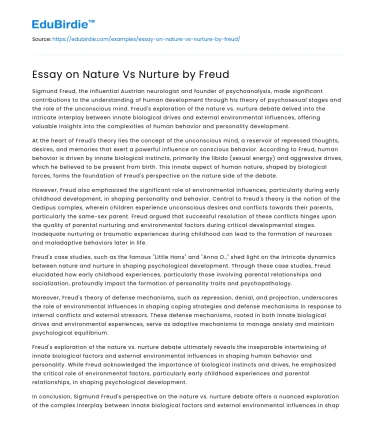Sigmund Freud, the influential Austrian neurologist and founder of psychoanalysis, made significant contributions to the understanding of human development through his theory of psychosexual stages and the role of the unconscious mind. Freud's exploration of the nature vs. nurture debate delved into the intricate interplay between innate biological drives and external environmental influences, offering valuable insights into the complexities of human behavior and personality development.
At the heart of Freud's theory lies the concept of the unconscious mind, a reservoir of repressed thoughts, desires, and memories that exert a powerful influence on conscious behavior. According to Freud, human behavior is driven by innate biological instincts, primarily the libido (sexual energy) and aggressive drives, which he believed to be present from birth. This innate aspect of human nature, shaped by biological forces, forms the foundation of Freud's perspective on the nature side of the debate.
Save your time!
We can take care of your essay
- Proper editing and formatting
- Free revision, title page, and bibliography
- Flexible prices and money-back guarantee
However, Freud also emphasized the significant role of environmental influences, particularly during early childhood development, in shaping personality and behavior. Central to Freud's theory is the notion of the Oedipus complex, wherein children experience unconscious desires and conflicts towards their parents, particularly the same-sex parent. Freud argued that successful resolution of these conflicts hinges upon the quality of parental nurturing and environmental factors during critical developmental stages. Inadequate nurturing or traumatic experiences during childhood can lead to the formation of neuroses and maladaptive behaviors later in life.
Freud's case studies, such as the famous "Little Hans" and "Anna O.," shed light on the intricate dynamics between nature and nurture in shaping psychological development. Through these case studies, Freud elucidated how early childhood experiences, particularly those involving parental relationships and socialization, profoundly impact the formation of personality traits and psychopathology.
Moreover, Freud's theory of defense mechanisms, such as repression, denial, and projection, underscores the role of environmental influences in shaping coping strategies and defense mechanisms in response to internal conflicts and external stressors. These defense mechanisms, rooted in both innate biological drives and environmental experiences, serve as adaptive mechanisms to manage anxiety and maintain psychological equilibrium.
Freud's exploration of the nature vs. nurture debate ultimately reveals the inseparable intertwining of innate biological factors and external environmental influences in shaping human behavior and personality. While Freud acknowledged the importance of biological instincts and drives, he emphasized the critical role of environmental factors, particularly early childhood experiences and parental relationships, in shaping psychological development.
In conclusion, Sigmund Freud's perspective on the nature vs. nurture debate offers a nuanced exploration of the complex interplay between innate biological factors and external environmental influences in shaping human behavior and personality. Through his theory of psychoanalysis and case studies, Freud elucidated how early childhood experiences, parental relationships, and unconscious conflicts contribute to the formation of personality traits and psychopathology. By acknowledging the intricate dynamics between nature and nurture, Freud's work continues to enrich our understanding of human development and the complexities of the human psyche.






 Stuck on your essay?
Stuck on your essay?

